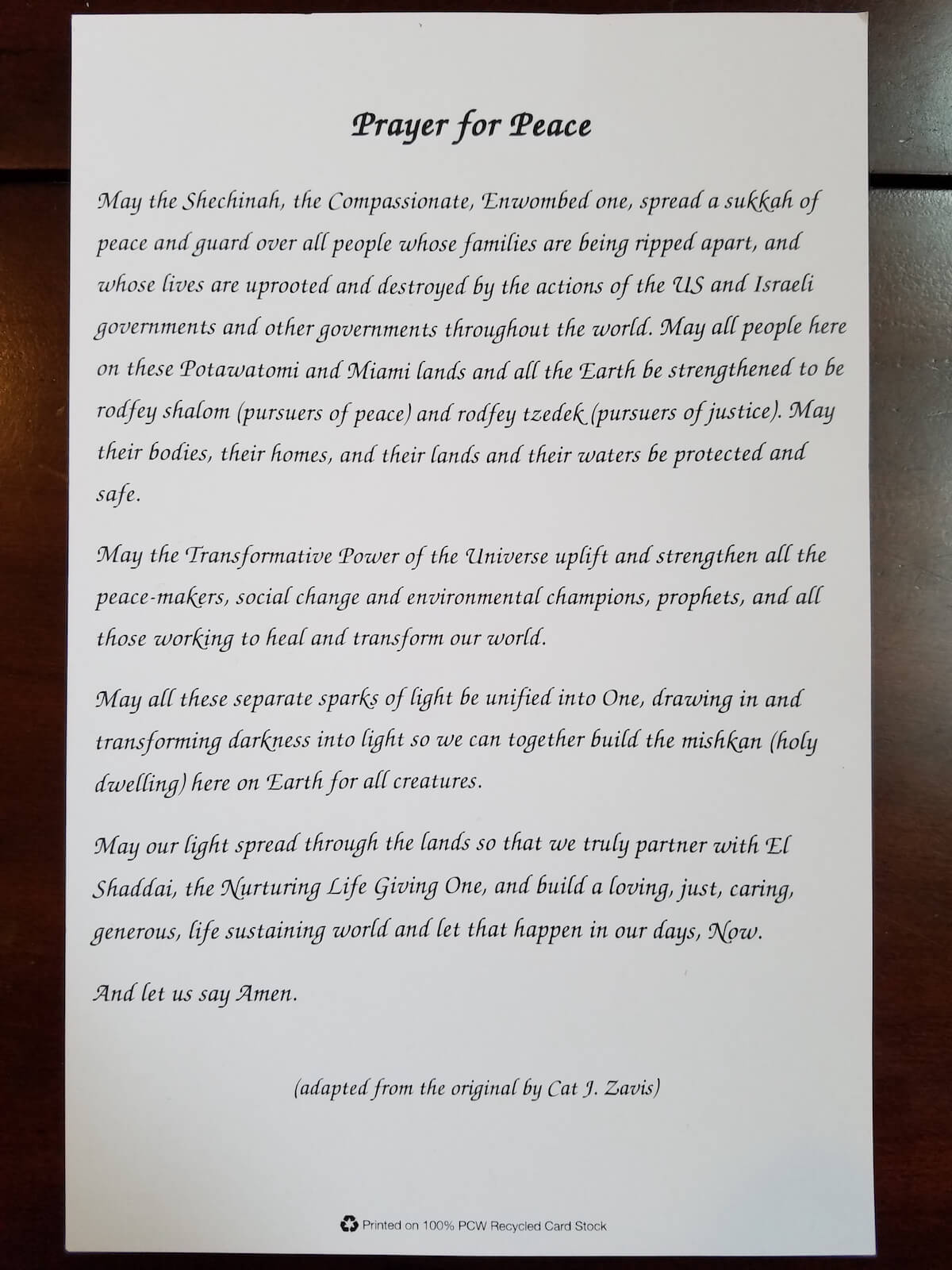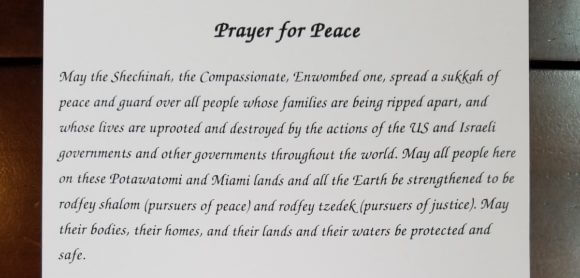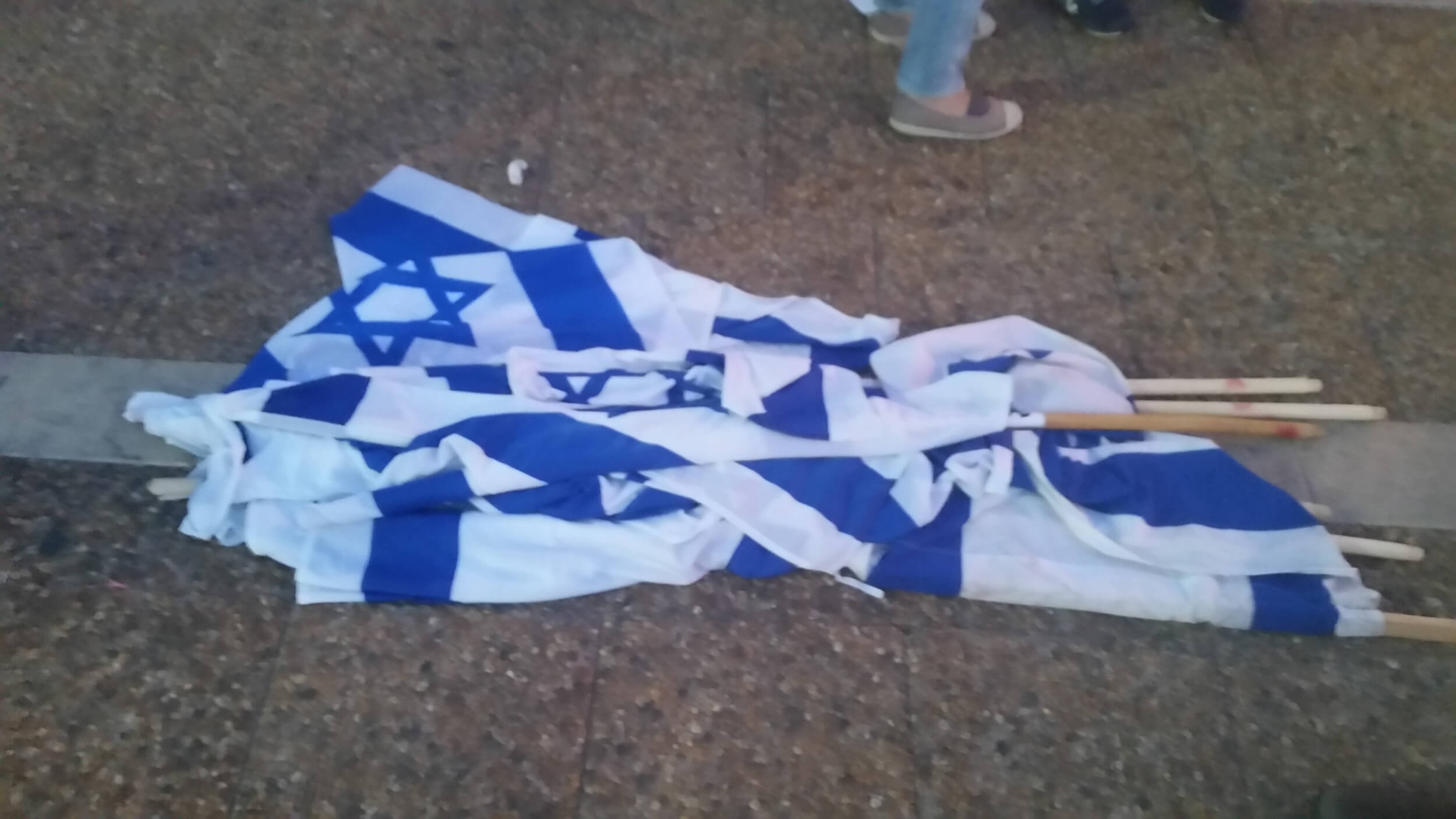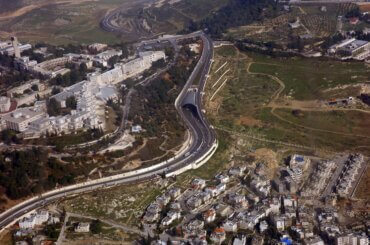Good day Rabbi Friedland,
During this past Shabbat’s service, I distributed an unauthorized “Prayer for Peace” to the congregation. I now write to explain why I felt called to share this prayer as a proposed alternative to several of our current blessings and symbols that send messages of war and subjugation. Humbly, I propose that our congregation consider democratically replacing the current versions of our weekly “Prayer for Our Country,” “Prayer for the State of Israel,” and “Prayer for Our Armed Forces,” and that we remove the U.S. and Israeli flags from our sanctuary.
Words and symbols have consequences, and the militarist messages in our service are surely not lost on the adults, teenagers, and children in our community. They affect how we treat others, how we share information online, how we vote, and how we contribute money. I’ve read in the Jerusalem Post that we Jews contribute some 50% of the Democrats’ donations and 20% of the Republicans’. Surely, then, our words have influence beyond the synagogue’s walls, and perhaps even on the policy of the world’s most powerful country. We could therefore make a measurable difference if we gathered each week to pray not for nation-states and armies but for internationalism and peace.

Over the past year and a half that I have attended this congregation, I have tried to imagine what I might think about these prayers if I were one of America’s or Zionism’s victims. I have always come to the conclusion that I would quite likely find these aspects of the service to be dangerous to me and my community.That is why I sit down during the prayers each week, and it’s why I have expressed to you and others in the community my opposition. But as I have thought and reflected, I now see a need to take a more vocal stance and to raise some serious questions about these prayers.
As we ask God each week to “Bless the State of Israel” and “strengthen the hands” of its military, how might this sound to the loved ones of the roughly 90,000 to 100,000
How might our blessing for the U.S. soldiers, thanking them for “protecting” us from “formidable enemies,” sound to families of the more than 1,600 Syrian civilians bombed by the U.S.-led coalition in Raqqa two years ago, or to loved ones of the half a million people killed in Pakistan, Afghanistan, and Iraq since 2001? Or to the veterans who have come to believe that they served in unjust wars?
How would our blessing of America’s “leaders and advisors” sound to migrants deported at Trump’s orders? What would disenfranchised prisoners and ex-prisoners think as we praise our elected officials’ “just and rightful authority?” How would our prayer for American “prosperity” sound to indigenous people whose lands have been torn up by companies pursuing endless profit?
What would the indigenous people of Turtle Island and Palestine think as we bow our heads each week to the front of the sanctuary where a U.S. and an Israeli flag stand above us? How many—though of course not all—might share the Wahpetunwan Dakota historian Waziyatawin’s view that the American Flag is “the ultimate icon of our own subjugation” or the Palestinian human rights group Adalah’s view that the Israeli flag’s exclusively Jewish iconography is discriminatory toward non-Jewish residents?
I wanted to get some outside perspectives, and I therefore shared the prayers with a handful of friends of mine who have had very different life experiences from my own. Some are elders and others millennials, but all are passionate campaigners for what we Jews call tikkun olam (repairing the world). I asked them, “From your outside perspective, are these blessings and flags actually instruments of oppression? Are they hateful or dangerous?” Several swiftly responded. None were surprised by these prayers and symbols, but all were upset by them.
“These prayers are very oppressive to me and people like me,” replied an Palestinian friend, an atheist living in the West Bank. “They’re outrageous. Hateful and dangerous.”
“The flag has never stood for freedoms of oppressed folks. The flag to me represents war, not freedom. The worst place to display a symbol of war is in a place of worship,” a Potawatomi tribal member wrote to me.
A religious Muslim friend, who lives in the United States, described the prayers as “egregious.”
“Israel is a colonial apartheid racist state. If we want peace, we must demand justice and human rights and work for those,” asserted a Palestinian Christian who lives in the West Bank.
“Nationalism in its extreme is the annihilation of the individual to the group, and I am not sure how that could be something that the god of the Torah, the New Testament, or Al Kor’an could condone,” replied a U.S. military veteran.
While these responses were challenging to read, they resonated with me as a descendant of Holocaust refugees and a relative of Holocaust victims and survivors. It is clear in retrospect that antisemitic and narrowly nationalist words and symbols in the 1930s and 1940s endangered my family, and I am grateful for those non-Jews who took action to resist these ideologies.
Following Leviticus 19:18—“Love thy neighbor as thyself”—I tried to act precisely as I would like someone to do on my behalf if I were targeted with words of war or hatred. I looked online and found an alternative “Prayer for Peace” by Cat Zavis of the Jewish magazine Tikkun. With Zavis’s permission, I made severalmodifications to her original, such as recognizing that we’re on the Potawatomi and Miami peoples’ land.
Then, I asked the local worker-managed Eco Owl Press to print 150 copies of the prayer on 100-percent recycled card stock. It was important to me that the form of the prayer was as peaceful and righteous as its content. Eco Owl Press affiliates with a union called the Industrial Workers of the World (IWW), which was perhaps this country’s first major union to accept as equals all workers regardless of their gender, sexuality, religion, race, ethnicity, nationality, or skill level.
As you know, I arrived early to Shabbat’s services and left the 150 copies of the prayer in stacks next to the siddurim (prayer books). I planned to announce with this letter that I had distributed the prayers, but I immediately came forward publicly when a volunteer entered the sanctuary to inquire of their origin.
I was disappointed to find that you took strong objection to my distribution of the prayer for peace. I would like to know: What is in these words of universal compassion that runs counter to your understanding of Judaism, or to our congregation’s stated “inclusive, egalitarian” values? Is it the mere fact that the prayer mentioned, albeit almost in passing, the victims of the U.S. and Israeli governments? What has happened to Judaism when such solidarities areconsidered controversial? What happened to our observance of the Torah’s commandment: “Do not oppress a stranger, for you know the feelings of the stranger, since you were strangers in the land of Mitzrayim” (Exodus 23:9)?
As I finished composing this letter, I received an email from you lamenting that I had subverted your “authority for spiritual direction.” “What you cannot do,” you wrote, “is take it upon yourself to share materials that are not vetted by me or the synagogue leadership.” “I am grateful,” you continued, “that you came forward to acknowledge what you had done so I could confiscate the prayers.”
I do not deny that I engaged in disobedience, and in fact I acted in a long tradition of disobeying public and private rules in order to advance the values of justice and righteousness that are the lifeblood of Judaism. “Let justice well up as waters, and righteousness as a mighty stream,” the prophet Amos implored (5:24). I do not expect to convince you of anything overnight, but it is precisely because words have consequences that I spoke up against hateful prayers and that I hope Zavis’s alternative prayer might spark difficult and deep discussions in our community.
As you stated so movingly in your Yom Kippur service, we do not need to choose between universalism and Jewish particularism: “It is not universalist ideals or Jewish loyalty. It is both/and.” I wholeheartedly agree. It is from universalist and Jewish (and many other) headwaters alike that the mighty stream of justice and righteousness flows. I hope my most minor and respectful act of disobedience created at least a small crack in the dam of injustice that obstructs these waters from freely flowing in all their breathtaking glory. Let us swim together in these rough though magical waters, now and throughout time.
With the utmost admiration and with loving disagreement,
Dan Fischer



I assume you are translating “rachamim” as enwombed one. Although the word rechem means womb and one can see a female aspect to god from the use of the world rachamim, this overly literal translation strikes me as politically correct, but linguistically false.
There’s a prayer for peace attributed to Rabbi Nahman of Breslav:
Prayer for Peace
May it be Your Will, Adonai our God and God of our ancestors, to put an end to war and bloodshed on earth, and to spread a great and wonderful peace over the whole world, so that nation shall not lift up sword against nation, neither shall they learn war anymore.
May all inhabitants of this planet come to recognize and know the ultimate truth: We did not come to this world for conflict and strife, nor for hatred, envy, mockery or bloodshed; We came to this world only to know You, may You be blessed for all eternity.
Therefore, have mercy on us, and fulfill for us what is written, “And I will grant peace in the land, and you shall lie down and none shall make you afraid. I will drive the wild beasts from the land, and neither shall the sword go through your country.”*(Leviticus 26:6)
“And justice will well up like water, righteousness like a mighty stream.” (Amos 5:24).
“For the Land will be filled with knowledge (some translate: devotion to) of Adonai as water covers the sea.”( Isaiah 11:9).
May it be Your Will. And let us say: Amen.
Please sign and share this new petition: “Remove Militarist Prayers and Symbols From Our Synagogues.”
http://chng.it/L8p8ChHTyR
And be in touch if you might want to start an interfaith version, since I believe this toxic mixture of religion and narrow nationalism affects many different religious communities.